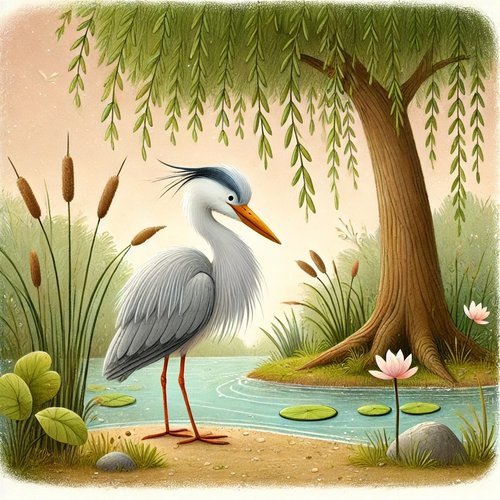Horace Groundhog Learns to Give Something Back
Horace Groundhog was not known for asking.
He was known for appearing. Quietly. Suddenly. Usually in the middle of someone else’s garden.
Not to be cruel. Just... to eat.
It was in his nature, he told himself, to take what was growing. To borrow what wasn’t fenced.
So when the new family of hares moved in beside the ash tree—with their tidy rows and cheerful signs and no fence in sight—Horace took it as a personal invitation to graze.
It was just a few radishes. A handful of pea shoots. Nothing they’d miss.
But on the third night, just as he was nudging a beetroot loose with his paw, someone cleared their throat.
A hare. Tall. Stern. Carrying a watering can and looking directly at him.
Horace froze.
They didn’t speak.
He dropped the beet and bolted into the brambles.
He didn’t return.
Three days later, there was a knock at his door.
Horace wasn’t expecting anyone. He didn’t expect anything, really. That was the safest way.
He opened the door two inches.
There, standing slightly sideways and clutching a basket with both paws, was a young hare with a ribbon that had come untied.
“Hello,” she said. “I’m Tansy.”
Horace squinted. “Tansy?”
“Yes,” she said brightly. “My mum says you might like soup.”
He glanced at the basket. Then back at her.
“Why?”
“We made too much,” she said, placing the jar beside him. “That happens sometimes.”
Then she waved, turned, and left.
Just like that.
She came again the following week. A pie this time, with the edges just slightly singed.
“Too long in the oven,” she said. “Still good inside.”
He didn’t say anything. But he didn’t close the door, either.
She came again after that. Muffins. Jam. A scarf that was technically unfinished but “works just fine if you don’t move too much.”
She told him silly stories that usually made no sense, and jokes that weren’t actually funny.
Horace never invited her in.
But he never asked her to leave.
A few weeks later, something had begun to grow near his doorstep.
A cabbage. He hadn’t planted it.
He considered pulling it.
Instead, he watched it grow.
One morning, Tansy arrived with nothing in her paws. Just herself.
“No basket?” he asked.
She shrugged. “Not today. Just wanted to say hello.”
He nodded.
She sat on the step beside him. They watched the cabbage. The sky. The bees.
After a while, she said:
“It’s funny. You don’t talk much, but you always look like you’re about to.”
Horace looked away.
He didn’t answer.
But he thought about it, long after she’d gone.
By midsummer, the cabbage had gone to seed. He let it scatter.
Then one cloudy afternoon, Horace pulled the largest of the cabbages—round, full, and a little lopsided, like most good things are. He brushed the dirt from its base, wrapped it in a cloth that smelled faintly of thyme, and set off.
He didn’t take the path. He took the long way, the one that curved behind the mossy log and past the stump where the post was picked up.
The hares’ garden was quiet. No baskets on the porch. No bells chiming.
Tansy wasn’t home.
So he placed the cabbage gently on the flat stone near their door, where the sun would catch it by afternoon.
Beside it, he left a note written in thick, deliberate letters:
I had too many cabbages.
—Horace
Then he walked home, empty-pawed, but full-hearted.















At Lady Elowen’s autumn lantern gathering, Lady Bergamot is drawn into a pairing with Yates Everett — and into a confrontation she has long avoided. Beneath flickering lights and half-truths, two hearts wrestle with the weight of what cannot be said.